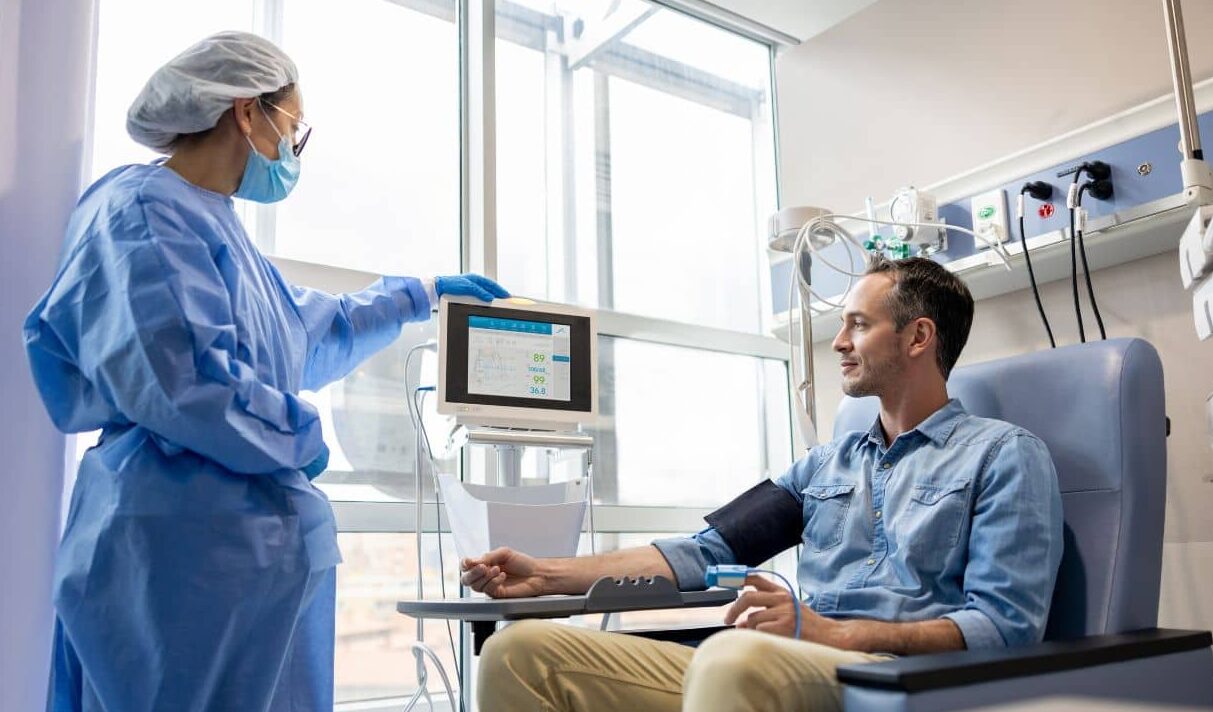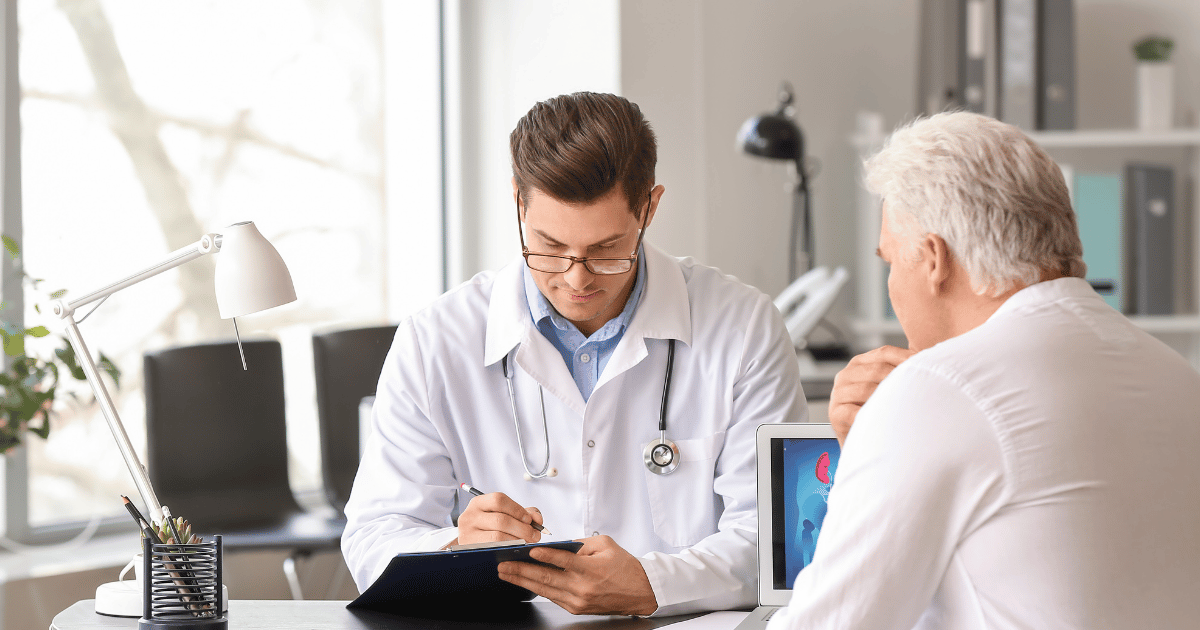-
 News
When glucose levels are low, chemotherapy ceases to affect cancer cells
News
When glucose levels are low, chemotherapy ceases to affect cancer cells
-
 News
Excessive treatment of prostate cancer in older men may reduce quality of life without increasing its duration
News
Excessive treatment of prostate cancer in older men may reduce quality of life without increasing its duration
-
 News
Brain cancer can be cured by viruses
News
Brain cancer can be cured by viruses
-
 News
Ways to reduce lymphatic pain in breast cancer have been found
News
Ways to reduce lymphatic pain in breast cancer have been found
-
 News
Scientists have turned bacteria into a powerful weapon against cancer
News
Scientists have turned bacteria into a powerful weapon against cancer
All news
Check-up clinics in Germany
Prevention and early detection of disease is the best way to avoid serious health problems and maintain a high quality of life. A medical check-up or a complete examination of the body is an ideal tool to assess the current state of health, adjust lifestyle, and identify pathologies at an early stage, even before the onset of symptoms.
Patients from different countries prefer to undergo check-up in Germany, trusting the high quality of German medicine. German clinics are widely known in the world for their excellent technical equipment, highly qualified medical personnel, as well as the use of progressive diagnostic and therapeutic approaches.
MedTour patients recommend clinics for the treatment of check-up in Germany:
Frequently Asked Questions
To be examined in a German clinic, it is enough to leave a request on the MedTour website. Medical coordinator will help with the selection of clinics and choose a preliminary program of check-up diagnostics. He will also help to solve all organizational questions, such as: buying air tickets, booking accommodation near the clinic, escort and transfer. The services provided by MedTour are free of charge. The patient pays for the check-up diagnostics program at the clinic.
Examination of the whole body in German clinics has a number of advantages:
- Modern diagnostic equipment and highly qualified doctors;
- Personalized service packages that take into account risk factors, anamnesis, and lifestyle of the patient;
- Ability to undergo a complete body examination within one clinic without an appointment or waiting in line;
- A wide range of instrumental and laboratory examinations;
- Test results are interpreted by experienced specialists in the shortest possible time.
The peculiarity of check-up diagnostics is that it is primarily aimed at healthy people. Regular preventive check-ups help to identify risk factors and detect diseases at an early stage, even if they are asymptomatic. After the age of 40, check-ups should be performed at least once a year. However, if a patient has a family history of serious illness or is exposed to factors that negatively affect health, more frequent check-ups may be necessary. In this case, the doctor will make an individual schedule of preventive check-ups based on the results of the first check-up.
A full body check-up can identify a wide range of health problems, including:
- High blood pressure;
- Elevated blood cholesterol levels;
- Diabetes mellitus;
- Cancer diseases;
- Neurodegenerative diseases;
- Impaired vision or hearing;
- Thyroid disorders;
- Coronary heart disease;
- Functional or structural lung disease;
- Diseases of the gastrointestinal tract;
- Impaired liver or kidney function.
The cost of packages depends on the type and number of examinations they include and the pricing policy of the clinic. Examples of prices for a full body check-up in German clinics:
- Basic check-up – from $1 400;
- Check-up for women – from $3 400;
- Check-up for men – from $3 100;
- Premium check-up – from $4 700.
Why do patients need to undergo a check-up examination?
Medical check-up is a comprehensive examination of the patient’s health status. Regular preventive examinations have a number of advantages, including:
- Detection of pathology at an early stage. One of the biggest problems in modern medicine is late diagnosis. Often, patients go to the doctor at the stage of development of complications. This complicates the treatment process and reduces the chances of a successful recovery. A medical check-up of the whole organism, which is offered by German clinics, helps to timely detect any deviations from the norm and, if necessary, start treatment.
- Prevention of future diseases. Based on the results of the examination, the doctor will suggest a lifestyle correction program that will help avoid future health problems. For example, at risk of developing cardiovascular disease, patients should monitor their blood pressure and do not forget about adequate physical activity. If the patient is prone to diabetes, they should normalize their weight and balance their diet. If there is a high likelihood of pulmonary pathology, quit smoking, etc.
- Reducing the cost of medical services. The disease, detected at an early stage, is easier to treat. Regular preventive examinations help to avoid long and expensive treatment in the future.
Who should check-up in Germany?
Check-up in German clinics will be useful to everyone who cares about their health. The age of the person does not matter. It is especially important to undergo periodic medical examinations of the whole body for people who are exposed to such negative factors as:
- Genetic predisposition is the presence of cardiovascular, neurodegenerative, oncological and any other diseases in blood relatives, the risk of which increases with a burdened family history.
- Lifestyle – being overweight, having bad habits, lack of physical activity, unhealthy diet.
- Working conditions – a managerial position, constant stress, unfavorable environmental or professional conditions, irregular working hours, violation of the work and rest regime, frequent business trips.
What does a basic check-up include?
Basic check-up packages in Germany may differ from clinic to clinic, but most of them include a standard set of examinations.
Preliminary consultation with a doctor:
- Evaluation of the medical questionnaire pre-filled by the patient;
- Discussion of current complaints, family and personal history, dietary habits, lifestyle, working conditions, level of physical activity;
- Instrumental examination.
Comprehensive examination of organs and systems:
- Evaluation of the cardiovascular system and lungs (echocardiography with color Doppler mapping, ECG at rest, check of lung function at rest – spirometry, check of lung and heart function during exercise – spiroergometry, check of blood oxygen level – pulse oximetry);
- Evaluation of the gastrointestinal tract (ultrasound of the abdominal organs, endoscopic examination);
- Assessment of the state of blood vessels (examination of blood flow in the arteries supplying blood to the brain, as well as in the arteries of the abdominal cavity and pelvis – color Doppler ultrasonography, angiography);
- Assessment of hearing and vision (checking visual acuity, measuring intraocular pressure – non-contact tonometry, checking hearing acuity – audiometry).
Laboratory diagnostics:
- Complete blood test, erythrocyte sedimentation rate, C-reactive protein level;
- Total cholesterol, HDL and LDL cholesterol, triglycerides;
- Early diagnosis of diabetes: fasting blood sugar, HbA1c, HOMA index;
- Kidney parameters: uric acid, creatinine, urea;
- Liver indicators: ALT, AST and bilirubin;
- Blood coagulation: coagulogram;
- Electrolyte balance: sodium, potassium, magnesium, calcium levels;
- Thyroid index: level of TSH, T3, T4, antibodies to thyroperoxidase, calcitonin;
- Iron metabolism: ferritin levels;
- Risk indicator for atherosclerosis: homocysteine level;
- Urine analysis: pH value, level of leukocytes, protein, glucose, ketones, erythrocytes, urobilinogen, nitrites, microalbumin.
Final doctor’s consultation:
- Discussion of research results;
- Drawing up an individual lifestyle correction program;
- Appointment of additional tests or treatment (if necessary).
What other check-up programs do German clinics offer?
In addition to basic service packages in Germany, patients can go through a specialized check-up. These can be diagnostic programs for men and women, the elderly, athletes and people leading an active lifestyle, as well as in-depth examination of various organs and systems.
For example, an oncology check-up in Germany, in addition to standard tests, will include:
- Chest x-ray;
- Computer tomography;
- Magnetic resonance imaging;
- Ultrasound of the thyroid gland;
- Colonoscopy;
- Gastroduodenoscopy;
- Dermatological examination;
- Fecal occult blood test;
- PSA blood test (prostate cancer screening for men);
- Pap smear and mammography (screening for cervical and breast cancer in women);
- Blood tests for tumor markers.
Cardiological check-up in German clinics also provides for additional research:
- Cardio CT;
- Cardio MRI;
- Holter monitoring;
- Consultation with a cardiologist.
In addition, other types of diagnostic programs are available in Germany:
- Gastroenterology check-up;
- Pulmonology check-up;
- Neurological check-up;
- Urologic check-up;
- Gynecological check-up;
- Check-up after COVID-19 and others.
Why is a whole-body check-up in Germany worthwhile
Patient can get a check-up in many countries around the world, but German clinics have a number of advantages:
- Preventive check-up programs are designed in accordance with current medical recommendations. Diagnostic service packages can be adjusted according to the individual needs of the patient.
- When examining in German clinics, there is no need to make an appointment with highly specialized doctors in advance or to waste time waiting in queues. Every check-up is carefully planned. You can undergo a basic diagnostic programme in just one day at one medical center.
- German clinics have powerful laboratories and state-of-the-art diagnostic equipment to detect even minor abnormalities.
- German doctors are highly qualified and clinically experienced. They rigorously follow strict protocols for efficiency and safety of diagnostic procedures.
- German clinics apply state-of-the-art methods for early disease detection. Programmes are drawn up by check-up specialists with specialized training in the field of comprehensive examination of the whole organism.
If you still have questions about check-up diagnostics in Germany, leave your request on MedTour’s website. A medical coordinator will contact you shortly and provide all necessary information.
Published:
Updated:


Information on this webpage verified by the medical expert





